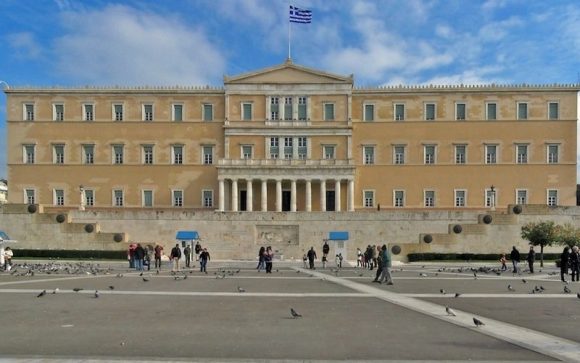The Hellenic Parliament
The Institution
What is the Parliament
The Parliament is the supreme democratic institution that represents the citizens through an elected body of Members of Parliament (MPs).
Plenum and Recess Section
The Plenum consists of all MPs elected in the same general election. General elections are normally held every four years unless Parliament is dissolved earlier. The interval between two elections is a ‘parliamentary term’. Consecutive parliamentary terms have been numbered in sequence since 1974.
The Parliament holds regular Sessions during a parliamentary term while the Constitution of Greece provides for extraordinary and special Sessions as well.
The Plenum convenes in regular Sessions every year on the first Monday of October. The duration of a regular Session cannot be less than five months. Within 30 days from the date of the general elections the Plenum must be convened in regular Session.
The Plenum is mainly responsible for the legislative and the parliamentary control functions. When Parliament is in recess, between two Sessions, part of the legislative and parliamentary control business is exercised by the compositions of the Recess Section.
There are three consecutive compositions of the Recess Section each year during the summer recess, each consisting of a third of the total number of MPs.
In the Recess Section participate one third 1/3 of the total number of MPs. The composition of the Recess Section changes periodically in order to ensure equal participation of all MPs.
The Parliament decides
The Plenum decides by an absolute majority of the MPs who are present. The absolute majority has to be at least ¼ (75 MPs) of the total number of MPs (300) in the Plenum. The Greek Constitution and the Parliament’s Standing Orders provide for cases that require special or qualified majority voting.
The Parliament legislates
The legislative work, namely voting of Bills and Law Proposals and the exercise of parliamentary control over the Government, are the core Parliament activities.
The legislative initiative belongs to the government, through one or more of its ministers, and to the MPs individually or as a group. Ministers introduce Bills (draft laws), amendments and additions while MPs introduce Law Proposals, amendments and additions under the conditions laid down by the Constitution.
Submission of Bills and Law proposals to Parliament
An explanatory report accompanies every Bill and Law Proposal to elaborate on its purpose and objectives. If a Bill or a Law Proposal incurs additional expenses for the State Budget, it must be accompanied by a General Accounting Office report specifying the amount of the expenditure involved. If a Bill results in expenditure or reduction of revenues, a special report regarding the coverage of the expense is attached and it is signed by both the Minister of Finance and the competent Minister. Bills must also be accompanied by an impact assessment report and by a report on the results of the public consultation that took place prior to the submission of the Bill.
The Scientific Agency of the Parliament, also submits a review on the proposed provisions. Bills and Law Proposals are submitted to the Parliament’s Directorate for Legislative Work, until the day Thursday at 20:00 pm, while the submission of amendments and additions on Fridays takes place until 13:00 the latest.
Then Bills and Law Proposals are announced to the Assembly and they are subsequently referred either for elaboration and examination or for debate and voting by the competent Standing Committee of the Parliament. The elaboration and examination of a Bill or a Law proposal includes two stages that are at least seven (7) days apart.
At the first stage a debate in principle and on the articles is conducted and at the second stage a second reading takes place followed by debate and vote by article. During the legislative elaboration of every Bill or Law proposal from the competent standing committee and until the second reading of the relevant articles, every special permanent committee can express its opinion on any specific issue that falls within its competence.
Parliament debates and votes on Bills and Law Proposals
Once the appropriate Standing Committee has completed the elaboration and examination or the debate and voting of Bills and Law proposals, the latter are entered in the Order of the Day to be debated and voted in the Plenum. Bills and Law Proposals are debated and voted in principle, by article and as a whole. Bills and Law proposals debated and voted by the appropriate Standing Committee are voted at once in principle, by article and as a whole by the Plenum. The Recess Section may debate and vote only the Bills and Law proposals that do not fall exclusively in the competence of the Plenum, according to the Constitution.
The President of the Republic promulgates and publishes all the Bills and Law Proposals passed by the Parliament within one month of the vote.
Apart from the legislative work the Parliament exercises other competencies such as:
- Constitutional revision
- Electing the President of the Hellenic Republic
- Voting of the Standing Orders
- Voting of the state budget, the financial statement of the state and the general balance sheet of the state as well as the adoption of the Parliament’s budget and its financial statement
- Approval of economic and social growth programs
- Resolution on the proclamation of a referendum
- Waivers of immunity
- The invitation to Heads of State, Heads of Government, and internationally acclaimed persons to address the parliament.

Parliamentary control
The Government is submitted to Parliamentary control according to the Constitution, following the procedure set out in the Parliament’s Standing Orders.
A vote of confidence
The Government must enjoy the confidence of Parliament. Each new Government, after a general election or after the previous government’s resignation, has to appear before Parliament and ask for a vote of confidence. During a parliamentary term, the Government may additionally ask for the expressed confidence of Parliament.
On the other hand, the Parliament may submit a motion of censure signed by at least 50 MPs (i.e. a sixth of a total 300), stating explicitly the subjects on which the debate is to be held. For a censure motion to pass, thus proving that Parliament has indeed withdrawn its confidence from the Government, the absolute majority of MPs (151) must vote in favor of the motion.
A motion of censure may not be submitted before the lapse of six months from the rejection by Parliament of such a motion. Exceptionally, it may be submitted before the lapse of six months, if it is signed by the majority of the total number of MPs.
Other means of parliamentary control
A motion of censure is not the only means by which the Parliament controls and scrutinizes Government actions. The Constitution and the Standing Orders of the Parliament provide further means for exercising Parliamentary Control. Through such means, the Parliament may ask the Government for clarifications and explanations or scrutinize of government actions or omissions.
Petitions
Individuals or groups of citizens may address the Parliament in writing to make complaints or requests. MPs may adopt such petitions upon submission or while they are being read before the Assembly. A Minister has 25 days to reply to a petition an MP has endorsed.
Questions
MPs have the right to submit written questions to Ministers on matters of public importance. Such questions aim at keeping Parliament updated on specific issues. Ministers have to reply in writing within 25 days.
Current questions
MPs have the right to submit written questions to the Prime Minister or Ministers on issues of current political significance. Current questions are answered and debated in the Plenum as well as in the Recess Section.
Interpellations
Interpellations aim at monitoring Government actions and omissions. Interpellations are addressed by the Plenum. Should there be more than one interpellation on the same subject the Parliament may decide their simultaneous discussion or even the generalization of the discussion.
Current Interpellations
Every MP has the right to submit current interpellations on current affairs. Such interpellations may be debated in the Plenum and in the first and third compositions of the Recess Section. The debate process that the Standing Orders specify for interpellations, applies in the case of discussing current interpellations.
Prime Minister’s Question Time
Once a week, the Prime Minister (PM) answers at least two current questions addressed specifically to him /her. The debate is conducted in the Plenum where the MP who submitted the question presents it orally in 2 minutes and both the PM and the MP have the floor. Most questions come from the presidents of Parliamentary Groups though individual MPs may also address current questions to the PM. In case the issue raised falls within the exclusive competence of a Minister, then the Minister may respond instead of the PM.
Requests to submit documents
MPs have the right to request in writing from Ministers, that documents on issues of public importance be available to them. The Minister has 30 days to submit these documents to Parliament. Still, no documents relating to diplomatic, military or national security issues may be claimed.
Debates initiated by MPs
Both in the Standing Committees and in the Plenum, under specific circumstances, debates on issues of general importance or interest may be conducted under the Parliamentarians’ initiative.
Parliamentary control over Independent Authorities
Each year, by March 31st at the latest, all Independent Authorities should have submitted their annual report on the activities and proceedings of the previous year. Reports are either transmitted to the Special Permanent Committee on Institutions and Transparency or to the competent Standing Committee, or any other competent committee, which should in turn acquaint in writing the Speaker of the Parliament with conclusions and findings.
The Speaker submits the reports of the committees to both the Government and the Independent Authority. As for subsequent reports on findings, there may even be a debate in the Plenum but no voting whatsoever.
Information and updates
In order to ensure the timely and reliable information of the Parliament, the Prime Minister may request permission to proceed with statements or announcements before the Assembly on major issues of public importance. In such instance, a short debate follows, during which the presidents of Parliamentary Groups participate.
Furthermore, Ministers inform and update the Parliament on issues of their competence.
Debates outside the order of the day
Such debates regard general issues or national affairs and involve Party Leaders. The Prime Minister, Parliamentary Group Presidents as well as one or two Ministers participate in such discussions. Seven debates outside the order of the day must be held during each Parliamentary Session, one initiated by the Government, one by the Speaker of the Parliament and five by the Opposition Groups.
Important innovations
With the recent amendment of the Standing Orders of the Parliament in July 2010 the following provisions were, among others above mentioned, included:
The empowerment of the Committee on Institutions and Transparency. The committee can request the hearing of state functionaries or any other public person for issues that appertain to the function of institutions and transparency.
The attendance of the relevant functionaries is obligatory. The committee may request the hearing of presidents, general commissioners and members of the country’s highest courts on functional issues that appertain to the judiciary enhancement of the transparency objective.
The establishment of the “State budget office”.The office is affiliated to the Speaker of the Parliament and is responsible for: a) the observation of the execution of the Budget, b) the collection, analysis and evaluation of all relevant information and data on forecasts regarding public expenditures and revenues as well as on the sustainability of long term fiscal figures, c) the assistance to the workings of the Standing Committee on Economic Affairs as well as to the workings of the Special Committee on the Budget, the Financial Statement and the General Balance Sheet of the State, d) the compilation and submission to the above committees of reports regarding:
1st, the observance of public fiscal targets as the latter are included in the Midterm Fiscal Strategy Frameworks and in the assumptions of long term economic estimations as well as in the public finances predictions and 2nd, the overall harmonization of the general governments’ politics on public finances with the procedures of the Law on “Public Finance management and Responsibility”.(Second Part of the Standing Orders)
Finally, it is not allowed to change the employee status of revocable employees in a way that results to their appointment in a permanent post of the Parliament. (Second Part of the Standing Orders).







